- Home
- Hugh Howey
Beacon 23: Part 3: Bounty (Kindle Single)
Beacon 23: Part 3: Bounty (Kindle Single) Read online
Beacon 23
Part 3: Bounty
by Hugh Howey
• 1 •
They say bad things come in threes, but I don’t think that’s true. I think bad things keep right on coming. They don’t stop. They’ll never stop. It’s just too depressing to keep counting, so we start over after the third bad thing. We hold our breath. We wait. We hope the universe will wait with us.
But then something else bad happens, and with dread and short memories we utter to ourselves, “Okay, that’s one,” and we brace for what’s next.
Something’s always next.
I live in a tin can on the edge of sector eight, and my job is to keep bad things from happening. My track record so far is less than stellar. A screensaver on one of my monitors reads 18 Days Since Our Last Accident. It ticks up by one each morning, so that’s progress.
Most ships pass through my sector at twenty times the speed of light, and they leave little more than a ripple on my grav scanner. But near on three weeks ago, some bastards took down my beacon, and a cargo bound for Vega splashed itself across the asteroid field in my back yard. Most of the wreck is still out there—what the pirates and scavengers and souvenir seekers didn’t cart off.
I guess if we’re counting, that was the first bad thing. The second was a little incident I’d rather not mention, but it involved a talking rock. Okay, it involved me talking to a rock—I’m pretty sure the rock never talked back. Just in case, I drilled a hole straight through the guy and hung him around my neck on a lanyard. Not sure if I did this to make sure the rock was really dead or to keep him close to my ears in case he talks again. Told you I wasn’t proud.
The third thing is the reason my body is covered in bruises, cuts, and scrapes right now. It’s why my ankle is either sprained or broken and my arm is in a sling. Two days ago, my grav panels started oscillating uncontrollably. Really turns a man’s world upside down. And right-side up again. And upside down. And—well, you get the point.
Now I’m a mess and my beacon’s a mess. Tools, food packs, spares, all went rattling around in their cubbies and cabinets until they burst forth like possessed demons. Hundreds of items are scattered all over the place, choosing to lie perfectly still now, like they’re all exhausted from the pounding they gave me. Taking naps. Waiting for me to tuck them all back in.
Before I do that, I’m wiring up kill switches for the grav generator. I put big red buttons on the ceilings of every living module and ran wires to breakers down in life support. Can’t step on the buttons by accident, but if my tin can gives me the old shake-and-bake again, I can hit one of these instead of trying to get down a ladder while gravity is rag-dolling me. Trying to get down the ladder the last time is what took my arm out of its socket.
I could probably call the incident in and list my wounds, and it’d be enough for NASA to send me home. Problem is, I don’t have a home to go to. Some part of me knows I’m here for life. And the way things are going, I reckon that won’t be for very long.
I finish the last wire splice on the new kill switches. Even with the floor grates up for access, I have to wiggle back under some of the pipes and conduits to reach the grav generator. Wrapping electrical tape around the splice, I laugh to see the same tape wrapped around one of my fingers. I ran out of bandages, so I resorted to taping up my cuts. The same stuff holds us together, me and my beacon. Hell, most of this place is a modification some previous operator made. It’s like a human body at age thirty-five, when not a single original cell is left. All that remains are the memories—the one damn thing we wish we could amputate.
Funny how that works. And funny how easily we forget the good times while the nightmares haunt us. Guess that’s a survival mechanism. We’re not here to be happy; we’re just here to be here. I spend a lot of time wishing I wasn’t—but that’s my dark secret, and not something I’m going to tell you. I don’t even whisper that to my rock.
Three bad things. They come like this, in little clusters for the counting. They’re coming for me now.
Ding-Dong.
The first of them arrives with the sound of a door chime.
•••
Okay, it’s not quite a door chime; it’s actually a hull proximity alert. But if you ask me, the old alert sounded too much like an air raid siren. Which ain’t so bad when it’s occasional, but with all the traffic after the cargo crash, it started jangling my nerves. It’s the waiting for it to go off that kills me. It’s the silent anticipation. Your whole body is tense, lying awake in your sleep sack, eyes wide open, seeing a buddy yell INCOMING! before a cloud of red mist blooms where a human once stood. Yeah, it’s not the sound of the siren that gets you. It’s the lying there, waiting. Listening to the silence. Counting.
I did some digging, figured out where the sound file for the alert was stored, and replaced it with a door chime. Of course, I couldn’t find a door chime in the archives, so I had to record my own. And yeah, I could’ve made a decent chiming sound with a wrench and some sheet steel, but I got lazy and just said Ding-Dong into the mic. Now, when I get a visitor, that’s what I hear. Gives me a chuckle. Sometimes, you’ve just gotta laugh. You just gotta hug your shins, rock back and forth, and laugh.
I wiggle my way out of the crawlspace, scooting along on my shoulder blades, rolling from one to the other, and pushing with my good foot.
Ding-Dong.
That’s me.
Ding-Dong.
I’m coming.
I pull myself out of the crawlspace and limp my way through the scattered debris. The climb up the ladder is slow with one hand and a sprained ankle. In the living quarters, I silence the alert using the switch by my sleep sack, then go up another flight into the command module. There’s a blast of static from the high frequency radio before a voice cuts in with a transmission.
“—con 23, this is Sanity’s Edge, over.”
I lift the mic with my free hand and wince as a stab of pain shoots across my ribs. Glancing out the nearest porthole, I see a ship hovering three or four klicks away, red and green lights blinking on each wingtip. Long pods with glimmering gold tips hang beneath the wings. Lasers. Pointing at me.
“Beacon 23,” I say. “Go ahead, Sanity.”
Checking the scanners, I see she’s registered to a Delphi corporation. The Delphi system is a tax-free zone; a lot of privately owned vessels hail from there, even if they’ve never touched atmo in Delphi. They just do the bill of sale in orbit and scoot.
“Permission to dock,” the pilot radios. “Official US marshal business.”
I glance back out the porthole. That ain’t no marshal boat out there. If she’s privately owned, and she’s really on marshal business, and she’s legally armed, then it can only be one thing: a bounty hunter. Looks like a whiff of excitement has drifted into old sector eight. I squeeze the mic.
“Beacons are NASA-oversight neutral territory,” I remind the captain. “By colregs, no arms are allowed on any beacon, nor are military or private security craft allowed to dock without warrant or express permission.”
Which is true and all, but what I’m really thinking is that the beacon’s a wreck, as am I, and I really don’t want visitors. I’m in my white NASA boxer briefs, and putting on a shirt with a bad shoulder is a pain in the ass. Well, not the ass, exactly, but you know what I mean.
“Beaming the warrant to you now,” the radio hisses.
I check my comm screen as the transmission comes through. After a brief scan, my systems tell me the document’s legit. There’s a twinge in my ribs as I take a deep breath.
“Docking collar Charlie,” I say. I reach over and flip on the homing light and energize the l
ocking collar. Then I think of a little white lie. “Uh . . . Captain, I’m under strict quarantine, so please stay aboard. I’ll come to you.”
There’s a pause on the other side.
“Quarantine?” the pilot asks.
“No longer communicable,” I assure him—and I feel like I can hear him exhale in relief.
If he checks the colreg logs, he’ll see that I’m not exactly lying. I am under quarantine. What the logs won’t say is that it was a computer virus, and that the victim was my beacon. Strange the lengths I’ll go to in order to keep people away from me, considering how lonely I feel most of the time. I guess that’s the strange torment I suffer: dying for company, for someone to talk to, but it’s never the right someone who shows. And an unwelcome presence is far worse than miserable silence.
•••
I head down three sets of ladders to the lock hub, the sling over my arm making the trip take longer than usual. Any weight on the ball of my left foot makes my ankle cry out, so I try to get my heel deep on the rungs, which just means repeatedly banging my shin. I considered going without gravity for a while, but one look at all the crap strewn everywhere and I imagine it floating and bouncing around. No thanks.
In fact, the wreck of my beacon comes into stark relief with the prospect of someone docking up. In addition to the stuff everywhere, I’ve got open access panels leading down into mechanical spaces and wires strung all over from my makeshift repairs. My walk suit is crumpled up in the middle of the docking module, and the door to the lifeboat is wide open. For a while there, I was wearing the suit all the time and sleeping in the lifeboat, but I stopped doing both those things after the shipwreck debris bombarding my beacon died down. Besides, I’m back to not sleeping much anyway.
I wait by the airlock for the pilot to secure his ship. Sniffing the air, I have this bad feeling that, despite the herculean effort from the air scrubbers and NASA’s PineFresh scenting system, the entire facility reeks of a college dorm room, midsummer, after an egg fight, with two dead skunks under a pile of soiled laundry. I breathe into my palm and sniff. Whatever olfactory sense I had died months ago. That’s good for me, bad for visitors.
A loud thump against the hull lets me know that the ship has arrived and that the pilot is a three on a scale of ten when it comes to jockeying a flight stick. If he’s making a living collecting bounties, that probably means he’s more of a terrestrial threat. More of a sleuth-and-taser kinda guy. This guess is vindicated once I’ve keyed my side of the airlock and he’s keyed his. The bounty hunter on the other side is straight out of one of those true-life holos where people repo your shit or haul you back to jail from some remote moon hideout.
His hair is in dreadlocks. His beard is long, and it’s knotted with bits of string so that it juts out in little clumps. There’s an unlit cigar between his teeth and mirrored shades wrapping his face. He’s got a bandana around his neck, another on his bicep, and one tied around each knee. His flightsuit is studded with bulging pockets, and even standing perfectly still, he jangles. I imagine he must keep the grav on his ship at a 0.7 to be able to stand all that nonsense. He has guns strapped everywhere, and an honest-to-goodness bandolier of large brass shells and grenades is draped across his chest like some warlord beauty contestant sash. What sounds vaguely like a dog yips somewhere from within the depths of his ship.
“Mitch,” the bounty hunter says, reaching out his hand with a jangle and clatter. “Mitch O’Shea.” We do that awkward arm-in-sling handshake where I extend my left hand, turn it sideways, and we go pinkie-to-thumb. He looks me up and down. “What happened to you?”
I realize I’m standing there in my boxers, barefoot, covered in bruises and duct tape. I dimly care.
“Gravity genset went on the fritz,” I say. “Started oscillating. Uncontrollably.”
The bounty hunter lowers his shades and narrows his eyes at me, almost like he has some truth-detecting superpower and is boring it into my brain. I glance up at the ceiling, and he glances with me. I glance down at the floor, and he does the same. We look up again. Then down.
“Yeah,” I say. “About like that.”
“No shit?”
I point to my slinged arm. “You ever hear it hurts worse to put a shoulder back in than it does to knock it out?”
He nods.
“Complete crap. Feels so good going back in. Like popping your knuckles. You should try it.”
“I’ll take your word for it.” He glances at my arm, at my attire, and then pushes his glasses back over his eyes. When he fishes a tablet from a pouch in the back of his flightsuit, I see that the small talk is over. Down to business. He holds the tablet out to me; it has a warrant displayed on the screen. I study a blurry image of a woman with short-cropped hair and an angry scowl. There’s all kinds of small text about what the government wants done with her and how much they’ll pay, but I just see the image. The tablet is taken back before I’m ready to let go of it.
“Have you seen her?” O’Shea asks.
“Nope,” I say.
“You sure?” he asks.
“Positive.”
O’Shea lowers his glasses and narrows his eyes at me again. I widen mine on purpose, throwing the blinds open, letting him really stare inside. Somewhere in his ship, an animal whimpers. If this guy could really see my thoughts, he’d probably be whimpering too.
The glasses go back up. I fight the urge to laugh out loud at this guy. There’s a chance, I realize, that all his gear came from a surplus store and he’s really new at this. Impossible to tell. In the army, rookies spent a lot of time charring their gear over trench fires and smearing their helmets with mud to fit in. The vets, meanwhile, spent their time trying to keep their shit maintained in order to stay alive. I sniff the air, looking for a scent of gun oil or WD-60 to get a handle on which sort of person Mitch O’Shea is. Unfortunately, due to the nature of my living quarters, my olfactory sense is stunted.
“Okay, well, I’ll need all ship scans for the last couple weeks,” O’Shea says. “Plus all radio logs.”
“Not many places to hide out here,” I say.
Mitch stares at me. At least, I assume he’s staring at me behind those glasses.
“There’s good reason to suspect this fugitive came through here,” he says. “I’ll also need to do some scans of my own, poke around a bit, but I want to warn you that this person is very dangerous—“
I say, “Ding-Dong,” cutting O’Shea off.
Well, a recording of my voice from two weeks ago does that. There’s another ship arriving in-system. I glance up the ladders, dreading the three-flight climb. It’s fifty-six rungs to the command level. Yes, I’ve been counting.
“Was that someone saying ‘ding-dong’?” O’Shea asks. He points his unlit cigar at the ceiling.
I clear my throat. Beacons aren’t meant for co-habitating. It feels like the NASA techs just left, and now I’ve got this guy seeing me in my briefs, nosing my dirty laundry, and hearing what I do to pass the time.
“You mind if I look out your canopy?” I ask. “Just to see who that is. It’s a long climb up with a busted wing.” I indicate the sling.
Mitch hesitates. Then he stands aside with a jingle and a jangle. “Don’t touch anything,” he says. “Cockpit’s this way.”
Yeah, toward the front of the ship, I nearly say sarcastically. From the bump he gave the locking collar, I’m pretty sure I’ve got more flight time than this bounty hunter does. But I keep it to myself and follow him toward the cockpit. We pass through what looks like a holding pen—gray bars run from floor to ceiling. There’s an animal in one of the pens, drinking out of a toilet.
“Cricket, stop that. No. Bad girl.”
The animal pulls its head out and turns to look at its master, water dribbling from its jowls. Looks like a cross between a dog and a leopard. Probably not even a little bit of either. Definitely alien. The animal goes back to slurping.
“Hardened criminal?” I ask, jabbing m
y thumb at the cell.
O’Shea laughs. “Cricket? Naw, I just put her away so she don’t maul you.”
I look back at the animal. She’s the size of the cougars we’d see now and then in the backwoods of Tennessee. Might be deadly, but I doubt it. Seems like a pushover, drinking out of that toilet and looking at us with that blank expression.
I follow O’Shea through a narrow hall. There’s an open door to a bunkroom with an unmade bed; just beyond that are some grated lockers with guns inside and big padlocks on the latches. We squeeze past these into the tight cockpit, and O’Shea pulls up his system scanner. I peer out the porthole to see another dark-hulled ship approaching the beacon.
“Goddamn,” O’Shea says.
“You got an ID on that?” I ask. The ship looks vaguely military. I don’t like things that look vaguely military. I hate the things that look really military. With me, it’s like a sliding scale of hate versus appearance with some direct correlation.
“Don’t need an ID,” he says, disgust dripping from his voice. He reaches across me for the HF mic. Squeezing the transmit button, he glares plasma rounds up through the canopy. “You know putting hull trackers on a bounty ship is a federal violation, right, asshole?”
The radio hisses a response: “You think I need a hull tracker to sniff you down, you filthy runt of a raped pig?”
I’m beginning to suspect these two know each other. I watch this new ship expel little volcano blasts of air as it orients itself to face us.
“He’s not going to shoot us, is he?” I ask.
“Nah, Vlad here is a chickenshit.”
I notice O’Shea squeezes the mic and raises his voice as he says this last bit.
“What did he mean by a ‘raped pig’?” I ask.
O’Shea shrugs. “He’s not so bright. Stay away from him.”
I look Mitch O’Shea up and down and consider what it might mean for this guy to label someone else “not bright.” Thoughts of black holes come to mind.
The HF squawks again. I adjust the squelch, since Mitch doesn’t seem to care to. Or maybe doesn’t know how. “Beacon 23, this is Vladimir Bostokov on federal marshal duty. Requesting docking procedures. I have a warrant. Over.”

 Refuse (The Silo Archipelago Series Book 1)
Refuse (The Silo Archipelago Series Book 1)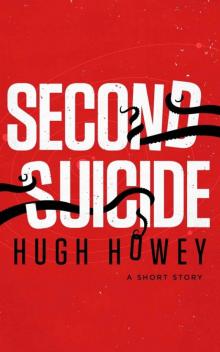 Second Suicide: A Short Story
Second Suicide: A Short Story Machine Learning: New and Collected Stories
Machine Learning: New and Collected Stories The Walk Up Nameless Ridge
The Walk Up Nameless Ridge Half Way Home
Half Way Home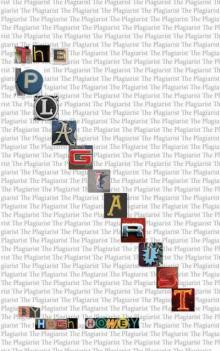 The Plagiarist
The Plagiarist Peace in Amber
Peace in Amber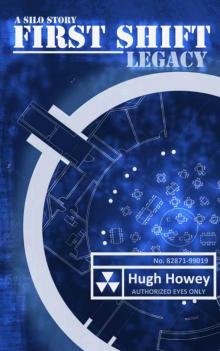 First Shift: Legacy
First Shift: Legacy Wool
Wool Glitch
Glitch Shift
Shift Dust
Dust Molly Fyde and the Land of Light
Molly Fyde and the Land of Light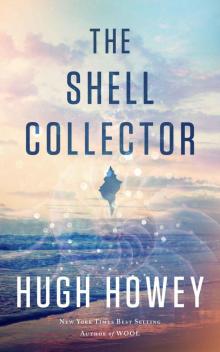 The Shell Collector
The Shell Collector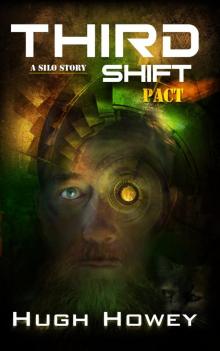 Third Shift: Pact
Third Shift: Pact Molly Fyde and the Fight for Peace
Molly Fyde and the Fight for Peace Sand Omnibus
Sand Omnibus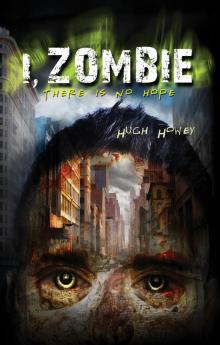 I, Zombie
I, Zombie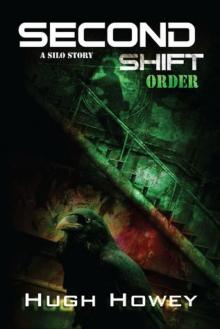 Second Shift: Order
Second Shift: Order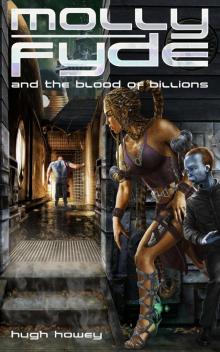 Molly Fyde and the Blood of Billions
Molly Fyde and the Blood of Billions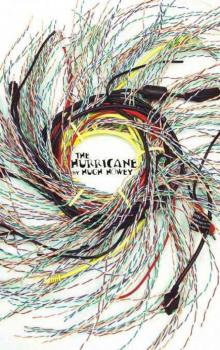 The Hurricane
The Hurricane The Box
The Box Glitch_A Short Story
Glitch_A Short Story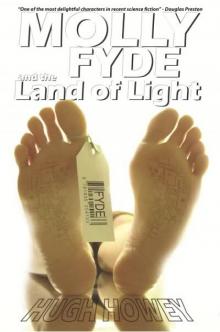 Molly Fyde and the Land of Light tbs-2
Molly Fyde and the Land of Light tbs-2 Machine Learning
Machine Learning Resist
Resist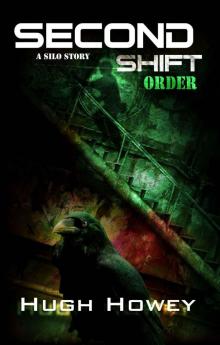 Second Shift - Order (Part 7 of the Silo Series) (Wool)
Second Shift - Order (Part 7 of the Silo Series) (Wool)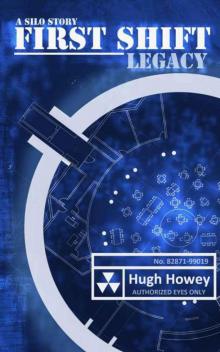 First Shift - Legacy s-1
First Shift - Legacy s-1 Stories on the Go: 101 Very Short Stories by 101 Authors
Stories on the Go: 101 Very Short Stories by 101 Authors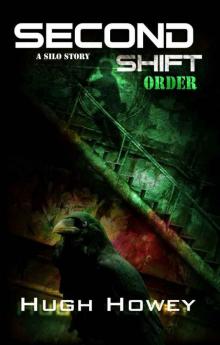 Second Shift - Order s-2
Second Shift - Order s-2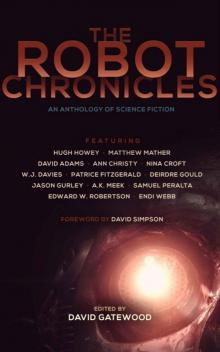 The Robot Chronicles
The Robot Chronicles Molly Fyde and the Blood of Billions tbs-3
Molly Fyde and the Blood of Billions tbs-3 Molly Fyde and the Parsona Rescue tbs-1
Molly Fyde and the Parsona Rescue tbs-1 Molly Fyde and the Fight for Peace tbs-4
Molly Fyde and the Fight for Peace tbs-4 Sand
Sand The Walk Up Nameless Ridge (Kindle Single)
The Walk Up Nameless Ridge (Kindle Single) Wool Omnibus Edition (Wool 1 - 5)
Wool Omnibus Edition (Wool 1 - 5) The World of Kurt Vonnegut: Peace in Amber
The World of Kurt Vonnegut: Peace in Amber The Alien Chronicles
The Alien Chronicles Glitch: A Short Story (Kindle Single)
Glitch: A Short Story (Kindle Single)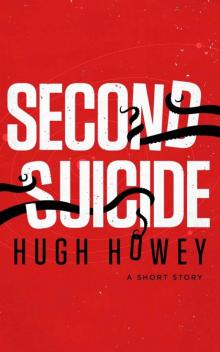 Second Suicide: A Short Story (Kindle Single)
Second Suicide: A Short Story (Kindle Single) Shift (silo)
Shift (silo)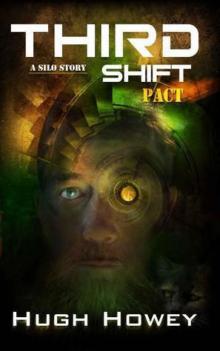 Third Shift - Pact
Third Shift - Pact Dust s-9
Dust s-9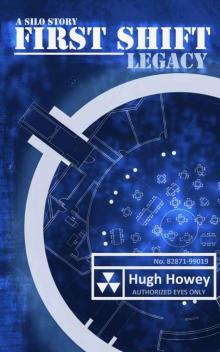 First Shift - Legacy (Part 6 of the Silo Series) (Wool)
First Shift - Legacy (Part 6 of the Silo Series) (Wool)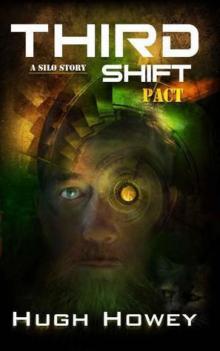 Third Shift - Pact s-3
Third Shift - Pact s-3 Sand: Omnibus Edition
Sand: Omnibus Edition The Box: A Short Story
The Box: A Short Story